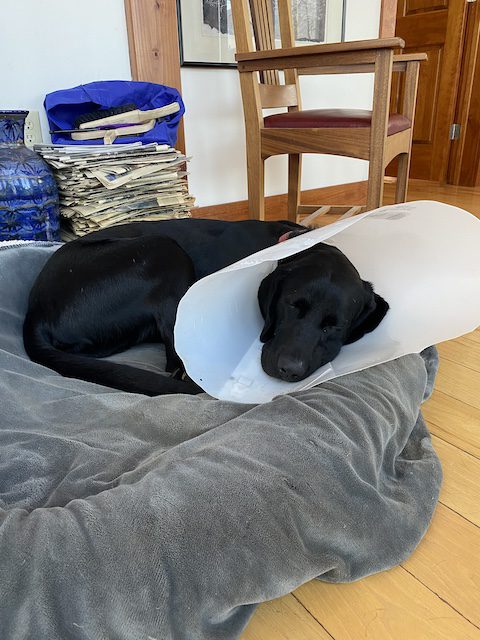
Listening is not my gift. That doesn’t mean I’m not called to be attentive to others, as a fellow blogger mentioned in her New Year’s Eve post. Caring for, seeing deeply, and knowing others just takes practice.
Listening to care for others
Over Christmas, Mac ran into something sharp and came home with a gash in his right side. He didn’t whine or bark or give any sign of distress, but his wound needed treatment as soon as the veterinary clinic reopened after the holiday.
Whenever anyone of us gets sick or injured, physical “listening” ramps up. That’s something I do relatively well. For instance, in mid-November—at the same time Keith and I were caring for one other’s food poisoning and nasty colds—Cato came home with a soft tissue sprain and cut on one of his back legs. Restricted activity and an anti-inflammatory took care of him. For Mac, it’s an antibiotic, anti-inflammatory, wound washing followed by the silver sulfide ointment, and the cone of shame to prevent him from licking it.
Even under normal circumstances, we all require lots of physical “listening” to take care of ourselves and others for whom we’re responsible. Perhaps even more, pack members want attentive listening. Everyone wants to be seen.
Listening to see others
In advance of our women’s spring retreat, I’m reading books about caregiving published by Stephen Ministries and others. In Christian Caregiving: A Way of Life, Stephen Ministries Executive Director Kenneth C. Haugk wrote about tangible ways we can be Christ to others, starting with active listening. When we provide care for hurting people, we participate in Christian therapy, to serve or to heal. Serving is relational and prepares others for healing.
Haugk: “Therapeutic processes are actions that the caregiver can perform: listening, empathizing, helping people talk through their feelings. In this sense, anyone involved in caring for another person is providing therapy.” Though Christian caregivers are involved in the process of serving and caring, they leave the outcomes and results to God.
Another source that I’ve just begun to read is How to Know a Person: The Art of Seeing Others Deeply and Being Deeply Seen, by New York Times columnist David Brooks. Back in 2019, I read his book The Second Mountain: A Quest for a Moral Life. Now, while I ponder “listening” as my word for this year and research caregiving for the retreat, I wonder:
How do I know who I’m called to care for since I can’t serve everyone?
Listening to choose intentionally
We live longer and better when we’re engaged with family, friends, and neighbors, anyone with whom we come into contact. But to find our purpose in these engagements, we have to discover the qualities, talents, personality traits that define us. We cannot choose our gifts, but we can choose how to put those we’ve been given to good use.
In Life Reimagined: The Science, Art, and Opportunity of Midlife, NPR journalist Barbara Bradley Hagerty writes: “The people who seem happiest are the people who feel like they’re able to express aspects of themselves that feel vital to them, that make them feel alive. It’s not any particular path you have to take, it’s being able to express the core of who you are.”
Discovering our core “essence” requires internal “listening”—and sometimes wearing a cone of silence to block out distraction. Putting our essence to good use means intentionally taking off that cone and listening to those we are called to serve. A match made in heaven.
I wish you all a blessed “listening” New Year -C.D.



C.D.~I’m sorry for the illnesses and injuries (for you both and your furry cuties). This is a beautiful and wise piece. I love listening and being a shoulder for others. It’s something I’ve worked hard to become more intentional and aware of~and in turn, I’ve been so blessed! May God bless us with ears to hear, eyes to see, and a heart to love! Happy New Year to you and yours!
Thank you, Karla. You sound like what David Brooks calls an “illuminator,” that is, one who sees and brings out the best in people. I am more of a “heady” person, and as such can distance rather than illuminate. But I am teachable, and you are one of my teachers. Bless you!
-Carole
You’re welcome, Carole. Thank you for this insight. That’s so helpful and kind! I was very teachable while in education (I learned the hard way like many!). I believe cognitive coaching, coupled with the ultimate power of Christ, was a win-win for me!
I started to distance for a while~God brought me out of it when I fell flat on my faith after some hard falls.
Your wisdom teaches me too! Many blessings!
Falling and failures are good teachers, aren’t they? I’ve had many, all blessings!
Amen!
I’m sorry for your families recent illnesses and trial.
I don’t have my word chosen yet, but I like how you decided on yours.
Happy New Year!
I wish you a blessed New Year as you find your word – or the word finds you. -C.D.
Thank you, Carole!
I am sure that you would be a wonderful speaker for a caregiver retreat. God bless you and guide you in your research endeavors, Carole!
Ah, thank you SO much, Cindie, for your kind support. As with many teaching experiences, I hope the retreat attendees gain at least a fraction of what I’m learning.